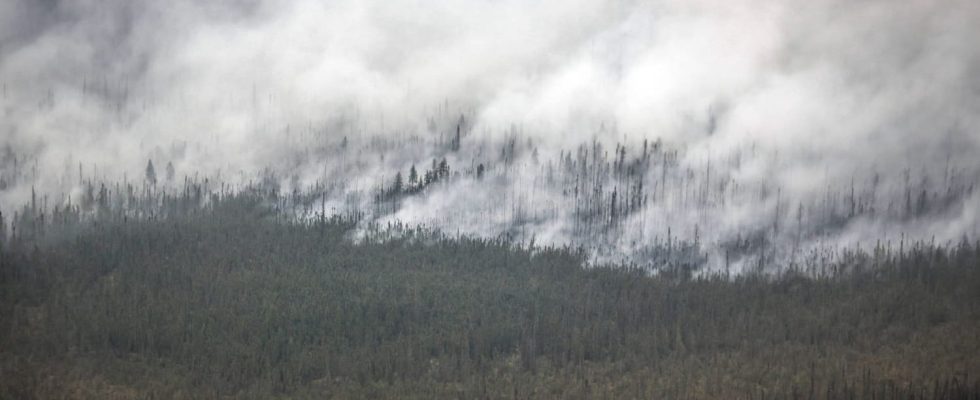13.9 million hectares have burned since the beginning of the year in Canada. The country is currently facing a historic fire season. In the North-West, the inhabitants of Yellowknife were called upon to leave the city before Friday, August 18 at midday, in the face of the threat of the flames.
[Mis à jour le 18 août 2023 à 14h30] 1,050: This is the dizzying number of fires that were still active in Canada as of August 17, 2023, according to the Canadian Interagency Forest Fire Center (CIFFC). The country is indeed facing a wave of fires unprecedented in its history, which began in May in the province of Alberta, located in the west of the country. Of these 1,050 active fires, 671 were out of control, 160 were contained and 219 were under control. A total of 13.9 million hectares have burned since the start of the year, again according to CIFFC. This is more than the area of Greece, which is nearly 13.2 million hectares.
Nearly 168,000 people have been forced to evacuate since the first flames, says The Parisian. On Wednesday evening, the 20,000 residents of Yellowknife, the capital of the Northwest Territories, were ordered to evacuate the city. “The city is not facing an immediate danger (…) but, without rain, the fire may reach the surroundings of the city this weekend”, warned Shane Thompson, Minister of the Environment of this territory. federal, calling the inhabitants from the city before this Friday noon. Words reported by The world. According to CIFFC, 236 fires were still active in the Northwest Territories as of August 17.
On August 11, Michael Norton, director general of the Canadian Forest Service, warned that the fire risk is expected to be “above normal” until September, reports Release. While forest fires are common in Canada during the summer season, their magnitude this year is exceptional. Thus, the federal government has already affirmed that the country is currently experiencing the worst fire season “ever recorded”, indicates West France.
It was at the beginning of last May that the first major fires broke out in Canada, in the province of Alberta located in the west of the country, as recalled The Parisian. At the end of May, Nova Scotia, in the east of the country, was in turn hit by the flames. At the beginning of June, the province of British Columbia, located in northwestern Canada, was also affected by the fires. Other large fires also broke out in the east of the country in July, in Quebec. In this mid-August, it is the turn of the Northwest Territories to face the scourge of the flames, as indicated earlier in this article.
If the wildfire season usually starts in May in the country, as reported The Parisian, they have been favored this year by a major drought that has hit Canada since the beginning of the year, but also by high temperatures. Due to its geographical location, the country is warming faster than the rest of the world. A 2019 Environment Canada report says Canada is warming twice as fast as the rest of the planet, says Le Figaro.
Canada has been dealing with extreme weather events such as these large fires for several years, recalls franceinfo. Climate change amplifies their intensity and frequency. In a kind of vicious cycle, the wildfires currently affecting the country have generated record carbon dioxide emissions, which only worsens climate change. “Our preliminary estimates indicate that emissions for the current season have exceeded one billion tonnes of carbon dioxide equivalent,” said Michael Norton, director general of the Canadian Forest Service, on August 11, reports Release.
In the next few years, the Canadian government even estimates that “the area devastated by forest fires should double by 2050 because of climate change.” In response, the country launched the “GardeFeu” mission: a satellite system to monitor its forests. But the Canadian Space Agency does not plan to put it into service until 2029. A significant period of time at a time when fires are threatening more and more.
Canadian firefighters are struggling to cope with the scale of the country’s fire season this year, facing a shortage of manpower, as recalled The Parisian. The Ile-de-France daily indicates that nearly 5,000 firefighters from other countries have been sent to help them since the first fires last May, and that the Canadian armed forces have also been called in for reinforcement. Australia and the United States are among the countries that have sent firefighting teams to Canada, as has France.
Among the possible solutions to respond to the scourge of forest fires, a debate exists in Canada on the possibility of betting on less flammable trees to replace the conifers that characterize Canadian forests. Some provinces are also open to the return of an Aboriginal technique that has been practiced for millennia: prescribed burning. It is a question of “avoiding the formation of a bed of plants which could serve as fuel for a possible fire” by burning the most combustible vegetation and dead wood before the summer season, according to the departmental fire department and relief from the Var.
